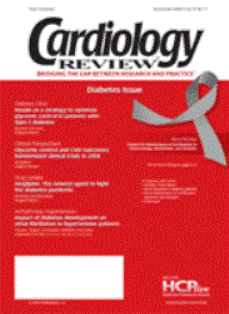Publication
Article
Cardiology Review® Online
Preparing for the American Board of Internal Medicine Maintenance of Certification
The following questions can assist candidates in preparing for the Maintenance of Certification Exam in Endocrinology, Metabolism, and Diabetes. Feedback regarding these questions is welcomed and can be sent to
.
These questions were prepared by Leslie S. H. Cho, MD.
Questions
1. A 65-year-old woman with bicuspid aortic valves presents to you for a follow-up examination. She is on 81 mg of aspirin only and is doing well. Her 12-hour fasting blood test shows a glucose level of 150 mg/dL. The patient reports no polydipsia, polyuria, or unexplained weight loss. According to the American Diabetes Association (ADA) guidelines, does she have diabetes?
a) Yes, the ADA guidelines indicate a fasting plasma glucose ≥126 mg/dL is diagnostic for diabetes.
b) No, according to the ADA guidelines, her fasting plasma glucose is suggestive, but she must have symptoms for the diagnosis to be made.
c) No, according to the ADA guidelines, she must have a 2-hour plasma glucose of ≥200 mg/dL during a glucose tolerance test.
d) Her HgbA1c needs to be known before the diagnosis can be made.
2. You are being consulted on the case of a 27-year-old woman who has type 1 diabetes, hypertension, and is 13 weeks pregnant. She is noted to have a blood pressure of 130/90 mm Hg by her obstetrician on several occasions. Currently, she is on insulin and prenatal vitamins and is being treated by her endocrinologist. Your opinion on medication is being sought. What is your treatment plan?
a) No need to treat.
b) Treat with losartan.
c) Treat with diuretic.
d) Treat with enalapril.
e) Treat with labetalol.
3. Your primary care colleague wants to know whether to start aspirin therapy on a 43-year-old premenopausal woman with type 2 diabetes and without any other known risk factors or cardiovascular disease. What is your recommendation?
a) Aspirin therapy for primary prevention should occur when the patient is older than 65 years.
b) In diabetic patients, aspirin therapy for primary prevention should occur at the age of 50 years.
c) Aspirin therapy should be used in diabetic patients older than 40 years.
d) Aspirin therapy should be used only if the diabetic patient has other cardiovascular risk factors.
4. What is the current recommendation regarding initiating statin therapy in a diabetic patient?
a) All diabetic patients should receive a statin regardless of their age or cholesterol level.
b) Statins should be prescribed for diabetic patients whose disease duration is greater than 5 years, regardless of their age or cholesterol level.
c) All patients over the age of 40 years should receive a statin, regardless of their baseline lipid levels and cardiovascular risk factors.
d) All patients over the age of 40 years with hyperlipidemia and cardiovascular risk factors should receive a statin.
e) There are no specific recommendations regarding diabetic patients; follow National Cholesterol Education Program (NCEP) guidelines.
Answers
1. a
According to the 2008 ADA guidelines, diabetes is defined by the following criteria: (1) fasting plasma glucose of ≥126 mg/dL, where fasting is defined as no caloric intake for at least 8 hours; (2) symptoms of hyperglycemia and a random plasma glucose ≥200 mg/dL; and (3) 2-hour plasma glucose ≥200 mg/dL during an oral glucose tolerance test.
2. d
During pregnancy, the blood pressure goal for a diabetic and hypertensive patient should be a systolic blood pressure between 110 and 129 mm Hg and a diastolic blood pressure between 65 and 79 mm Hg. Angiotensin-converting enzyme inhibitors and angiotensin receptor blockers are contraindicated in gravid patients. Drugs that are known to be safe and effective in pregnancy include labetalol, diltiazem, clonidine, prazosin, and methyldopa. Chronic diuretic use during pregnancy has been associated with reduced maternal plasma volume.
3. d
The ADA recommends aspirin treatment at 75 mg to 162 mg daily as a primary prevention in type 1 or 2 diabetic patients who are older than 40 years and have additional risk factors, such as smoking, hypertension, family history of cardiovascular disease, hyperlipidemia, or albuminuria.
4. d
Statin therapy should be started in diabetic patients with overt cardiovascular disease regardless of their baseline cholesterol levels and in those over the age of 40 years who do not have cardiovascular disease but have 1 or more cardiovascular risk factors.






